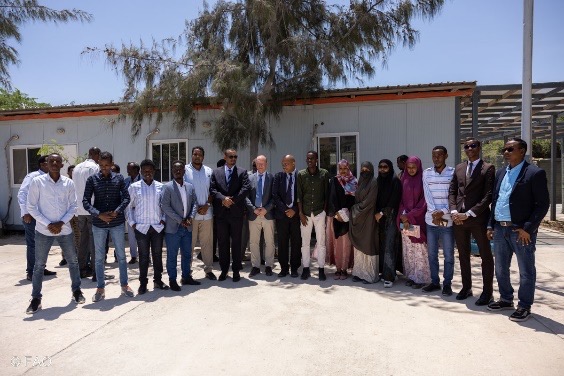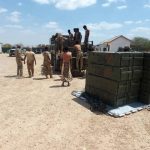Mogadishu, (SONNA) – 102 students received scholarships to be trained in veterinary medicine and animal husbandry courses in an event held in Mogadishu this week. The initiative allows the scholars to study at the Somali National University in Mogadishu and is supported by the Food and Agriculture Organization of the United Nations (FAO), and the European Union (EU) through the ‘Resilient Fisheries and Livestock Value Chain for Inclusive and Sustainable Growth in Somalia’ (RAAISE) project. Through the initiative, the scholarship will support young men and women for three years and cover the tuition fee and graduation projects. The last group of students will graduate in January 2025 with a BSc in Veterinary Medicine and BSc Animal Husbandry.
The launch event was attended by the Minister of Livestock, Forestry and Range, Hon. Minister Hassan Hussein Mohamed, team leader for the Resilience, Infrastructure and Productive Sectors section of the European Union Delegation to Somalia, Mr Jens Hoegel, FAO Somalia Head of Programme, Mr. Ezana Kassa, and Rector of the Somali National University, Prof Hassan Omar Mahadallah.
The new scholarship program demonstrates the importance of tertiary education in building capacities in sustainable livestock management. It recognizes the sector as a critical avenue of development in Somalia, requiring joint commitment and a strong skills base.
“It is critical for Somalia’s development that we develop the capacity and skills of young Somalis and this is at the heart of the RAAISE project,” said the European Union Head of Section, Jens Hoegel. “The European Union is committed to equipping the youth with the training to lead their country towards a sustainable future.”
Managing livestock in a sustainable way
The livestock sector is the most significant economic contributor to Somali livelihoods, with over 65 percent of the population engaged in the industry. Thus, the sector is also vulnerable to climate shocks and external economic impacts, reflecting a need to emphasize livestock livelihood enhancement, job creation and broad-based sustainable and inclusive growth.
Ministries, NGOs, resource partners, private entities and international organizations often struggle to find qualified Somalis to take up positions in public and private roles to manage livestock production and value-addition activities that can enhance the sector in the long term. This, in part, is due to the lack of sustainable management components in undergraduate courses of the veterinary and animal health sciences programs at Somali learning institutions.
“The livestock sector plays an important role in the future development of Somalia. It is vital that young people are engaged in the development of the sector and have the opportunity to learn how to manage pastoral livelihoods sustainably,” said Mr. Ezana Kassa, the FAO Head of Programmes in Somalia. “Undertaking an undergraduate degree establishes a foundation on which a lifetime of growth and learning can be built and results in long-term benefits for individuals and the broader livestock sector in the country,” he said.
Diversifying and strengthening Somalia’s livestock sector
The RAAISE Project builds on recent progress made in increasing employment and food security for people by sustainably expanding the fisheries and livestock sectors in Somalia.
In the livestock sector, the project aims to create new jobs, increase and diversify livelihoods, foster inclusive economic opportunities, and rehabilitate infrastructure such as animal holding grounds and livestock markets with supportive shades. It will also introduce fodder storage sheds and honey houses, forms of infrastructure that do not exist in Somalia and are essential for supporting the fodder and honey trade.





